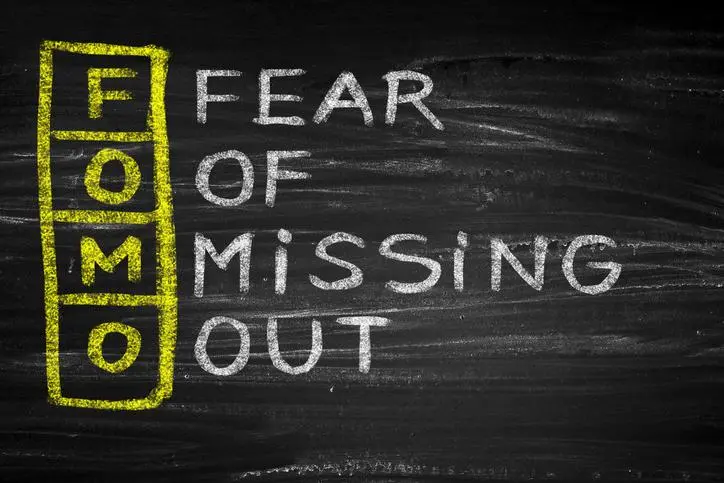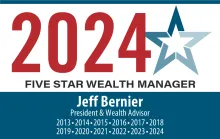
By Jeff Bernier
The fear of missing out. We’ve all experienced it. In fact, it’s so prevalent that it even has a popular acronym: FOMO. And while FOMO probably doesn’t create disastrous consequences in most of life, for investors, it can be the thing that turns a solid, long-term strategy on its head.
In today’s environment, FOMO can be especially problematic. Adding to the challenge is the media cycle around next year’s US Presidential election. We’ve been here before.
In the fall of 2016, everyone seemed convinced that the US Presidential election would have a dramatic impact on the market. A solid half of the people I spoke to told me they wanted to shift their strategy in case Hillary Clinton was elected. The other half wanted to do the same in case Donald Trump won the White House. Luckily, I was able to explain to investors in both camps why making a change would be a mistake. The result: not one client changed their appropriate long-term strategy. Since November 4, 2016, the Dow has risen from 17,888 to a record-breaking 27,359 earlier this month. The S&P 500 is also higher than ever, up from 2,085 just before the election to a high of 3,010 just days ago. Those who stuck to their strategy benefitted from the rally.
Of course, many, many things have come together to create that very welcome market advance. Things like an expanding global economy, rising corporate earnings, lower unemployment rates, the GDP, and other key economic indicators—none of which makes for very exciting dinner conversation. Instead, it’s the sensational stories of “home runs” that we often hear from the mouths of our neighbors, our colleagues, and the media that tend to prick up our ears and spark our interest.
Just last week, I got a call from a client who was concerned about his portfolio. The reason? “I’m not keeping up with the S&P 500, and those stocks are on fire!” He went on to tell me that he’d been at a party with a friend who apparently owned a crystal ball (my words, not my client’s) and had put everything he owned in the S&P 500 recently. His gains have been tremendous. The friend is on cloud nine, and yes, my client is feeling the FOMO.
I’m not surprised. His friend has done extremely well, but he got lucky with his timing, much like a big winner in Las Vegas will get lucky. Sometimes. But that sort of luck simply doesn’t last. Here are three things to keep in mind to help keep FOMO at bay and keep your investment strategy on track:
- Market cycles are inevitable. Maybe my client’s friend is mentally prepared to lose 50% of his value in a downturn, but he likely won’t be talking about it over cocktails when it happens. “Bear” markets are inevitable, and as the chart below illustrates, are even to be appreciated. Since 1929, there have been 11 bear markets (defined as a 20% decline), averaging a peak-to-trough decline of 45% and about two years in duration. While the average “bull” market averages about four and a half years in duration, it takes an investor with a titanium stomach to be able to hold during declines of this magnitude.
- Diversification is your best protection. Remember that diversification works—even when you don’t want it to. A diversified portfolio is designed to do two things: capture positive long-term market returns and reduce volatility (which is precisely what helps mere mortals stick to their strategy!). Today, the S&P index is flying high, but it lost 3.6% per year in the 9 years prior to March 2009 at the bottom of the financial crisis. Back in 2013, “unicorns companies” were making headlines and using FOMO to attract investors, though only 0.07% of them ever reached their $1 billion valuation mark. (Read more about unicorns in my blog post here.) And don’t forget the DotCom Crash, Black Monday, and, yes, 2008. It’s easy to get investment amnesia and forget that these things happen, and today it may feel logical to pile everything into a particular market because it happens to be winning—today. But when the tide turns, a diversified approach will likely win the day.
- Your investment strategy is based on your specific goals (or at least it should be!). What is your money for? If you’re like most people I know, you’re not investing simply to build a fortune, but rather to create financial freedom that enables you to pursue greater meaning and purpose in your life. In other words, investing isn’t a game to be won, but rather a path toward financial confidence and success—however you define it. Once we understand your needs and your goals, we collaborate with you to build a strategic financial and investment plan with a reasonable probability of funding those goals. And, importantly, we make adjustments as necessary. The thing that can deal a blow to a plan from which it may never recover is a rash decision based on FOMO!
If you’re struggling with a little FOMO, don’t feel bad. Back in 2002, Daniel Kahneman, a Princeton University psychologist, was awarded the Nobel Prize in Economic Sciences. What he and his colleague Amos Tversky discovered was that, more often than not, people base their decisions on factors economists traditionally don’t consider—like FOMO. In other words, you’re not alone. Even as an experienced financial advisor, neither am I. As Kahneman discovered, our drive to make decisions based on emotions is simply human nature. That’s precisely why our team applies the rules of evidence-based investing to every portfolio we manage. This approach keeps FOMO at bay and keeps your long-term strategy on target. None of us knows what the market will do tomorrow. Even if we’re sure we have all the facts, chances are the market will act and react in unexpected ways. Your best defense is to build a strategy based on your own investment goals—and to stick to it.






